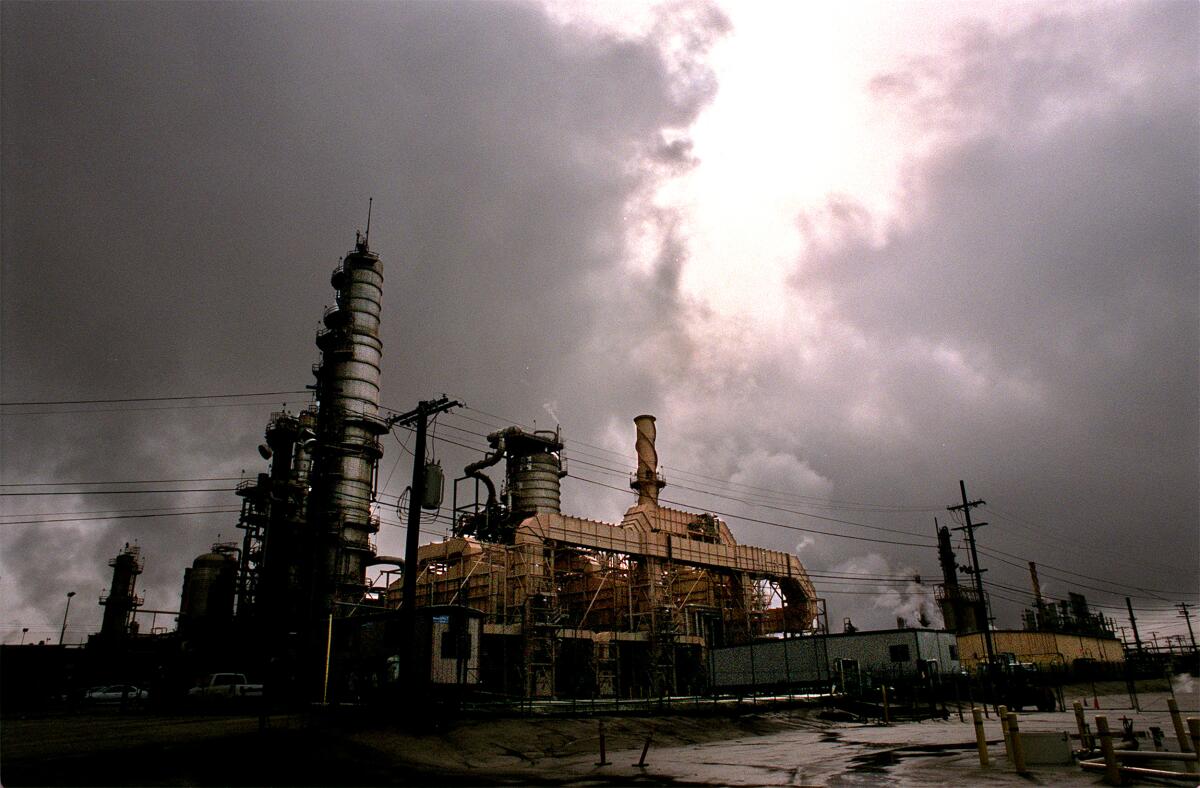House panel plans to subpoena oil companies as executives are grilled on climate disinformation

- Share via
WASHINGTON — Democratic lawmakers denounced the leaders of the some of the world’s largest oil companies Thursday, accusing executives of Exxon Mobil, BP, Shell and Chevron of spending decades downplaying, or outright denying, the scientific consensus that burning fossil fuels causes climate change.
The hearing by the House Oversight Committee marked the first time that members of Congress have directly questioned oil and gas executives, under oath, about their companies’ reported efforts to mislead the public about the causes of global warming.
Democrats on the committee also criticized the executives for publicly trumpeting their work to reduce carbon emissions while privately funding lobbying groups such as the American Petroleum Institute and the Chamber of Commerce, which have sought to block President Biden’s environmental policies.
New York Rep. Carolyn B. Maloney, the chairwoman of the committee, announced at the hearing’s end that she intends to issue subpoenas to the four oil companies, after they failed to turn over internal documents the committee requested relating to their funding of outside advocacy groups that don’t disclose their affiliations.
“I had hoped today would be a turning point for the oil industry … but I was disappointed that we heard much of the same denial and deflection that we’ve heard before,” Maloney said. “I see no choice but to continue our committee’s investigation until we see the truth.”
In their remarks Thursday, some of the executives denied lying about the causes of climate change, while others avoided addressing the allegations.
Chevron’s “views on climate change have developed over time,” said Michael Wirth, the company’s chief executive. But, he said, “any suggestion that Chevron is engaged in an effort to spread disinformation and mislead the public on these complex issues is simply wrong.”
Testifying remotely, the executives emphasized that they supported taking global action to address rising temperatures and endorsed the 2015 Paris climate agreement, which isn’t enforceable and doesn’t require oil companies to lower their emissions. All four acknowledged the threat of climate change. But they also stressed that the United States would continue to rely on oil and gas for decades to come.
At one point in the hearing, Rep. Ro Khanna (D-Fremont) implored the executives to direct the American Petroleum Institute, the industry’s largest trade group, to stop opposing congressional climate initiatives and to leave the organization if it keeps lobbying against expanded tax credits for electric vehicles.
“They’re spending millions of dollars in Congress to kill electric vehicles,” Khanna said. “You could do something here. You could tell them to knock it off for the sake of the planet.”
Khanna asked Shell President Gretchen Watkins to tell API President Mike Sommers, who was also a witness at the hearing, that the trade organization’s opposition is wrong.
“If you say that today, he’ll stop,” Khanna told Watkins.
Shell “very much believes electric vehicles are part of the future,” Watkins replied, but she declined to tell API to withdraw its opposition to the electric car tax credits.
Wirth, of Chevron, said his company discusses many policy issues at API, adding, “Members don’t always agree on everything.”
Quitting the trade group is an option, Khanna told the executives, reminding them that this year, French oil giant Total became the first major petroleum company to walk away from API. The company cited irreconcilable differences with the trade group over carbon pricing, regulation of methane emissions and electric vehicle subsidies.
“I really don’t think you’re as bad as the CEOs of the past,” Khanna said to the executives. “And I don’t believe you purposely want to be out there spreading climate disinformation. But you’re funding these groups, and they’re really having an impact.”
Republicans on the committee rushed to defend the oil companies.
Rep. James Comer of Kentucky, the senior Republican on the committee, criticized the hearing as political theater and said the committee should instead direct its investigative powers at the Biden administration’s economic and environmental policies. Republicans care about the climate, Comer insisted, but “the last thing in the world we need to do is cut [oil] production.”
After learning that Democrats planned to subpoena documents from the companies, Comer objected, saying: “We feel like that’s an infringement upon their 1st Amendment rights.”
Thousands will attend the U.N. global climate summit. While hopes for a major breakthrough are slim, here’s what leaders hope to get done.
The hearing was held just as world leaders are preparing to meet in Glasgow, Scotland, on Sunday for the beginning of a major United Nations climate summit. Under the terms of the 2015 Paris climate agreement, countries are expected to announce their latest plans to reduce carbon emissions and to pivot to cleaner sources of energy by the end of the decade. As Biden was headed to the summit Thursday, the details of the climate measures in Democrats’ final budget bill were still in flux.
Democrats on the panel focused many of their questions on accusations that the oil industry and its powerful trade organizations have spent billions on lobbying and deceptive marketing campaigns intended to weaken or kill legislation to address climate change. They pointed to a secret recording, which became public this year, in which an Exxon lobbyist talked openly about efforts to dilute Biden’s climate agenda and admitted that the company had funded third-party groups with the same goal. The lobbyist thought he was talking to a job recruiter; he was actually being recorded by Greenpeace UK.
More than the other oil companies, Exxon has a well-documented history of funding both pioneering research into climate change and large-scale campaigns that undermined those scientific findings. Reporting by the Los Angeles Times and Inside Climate News in 2015 found that, throughout much of the 1980s, Exxon funded workshops and academic research on climate change. But by 1990, its leaders changed tack after U.S. and international regulators began calling for cuts in carbon emissions from fossil fuels, threatening the company’s business model.
Over the next 15 years, Exxon spent millions of dollars on advertisements and other messaging claiming that the science behind climate change was still unsettled and that regulations to curb global warming were unnecessary, The Times’ investigation found.
Throughout much of the 1980s, Exxon earned a public reputation as a pioneer in climate change research.
Subsequent reports, including a 2019 study by scientists at Harvard, George Mason and Bristol universities, concluded that the oil industry as a whole had funded similar campaigns to undermine public confidence in climate research.
Before the hearing, Democratic lawmakers said they hoped to model the event after the 1994 House inquiry into the tobacco industry. The drama of that hearing was captured in a famous photograph of the top executives of the seven largest American tobacco companies raising their hands before Congress to swear that cigarettes aren’t addictive.
At the time, there was solid scientific research establishing the health risks of smoking, and executives’ lies outraged lawmakers, who went to work on new tobacco regulations.
Today, there is virtually no debate among scientists that the planet is overheating, in large part because the burning of coal, oil and gas is spewing greenhouse gases into the atmosphere. But whether Thursday’s hearing will inspire lawmakers to crack down on carbon emissions from oil and gas companies remains to be seen.
Biden announced this year that the U.S. would slash its emissions by at least half by 2030. But Democrats’ proposals to meet that goal have been diluted over the ensuing months, as Democratic Sens. Joe Manchin III of West Virginia and Kyrsten Sinema of Arizona objected to measures that would speed America’s transition from oil, gas and coal.
A proposal to create a clean energy program that would reward utilities for generating more of their power from wind and solar energy has been stripped from Democrats’ original $3.5-trillion budget bill to satisfy Manchin. Democrats’ alternative pathway to address climate change, a carbon tax on polluters, is also dead. That has left a set of tax credits for solar and wind projects and electric vehicles as the most significant remaining climate proposal in the package — but this also faces opposition.
The oil and gas industry’s campaign to defeat the president’s climate policies has taken aim at Democrats in Congress facing tough reelection campaigns through Facebook and TV ads in order to preserve tax breaks for fossil fuel producers.
More to Read
Get the L.A. Times Politics newsletter
Deeply reported insights into legislation, politics and policy from Sacramento, Washington and beyond. In your inbox twice per week.
You may occasionally receive promotional content from the Los Angeles Times.














